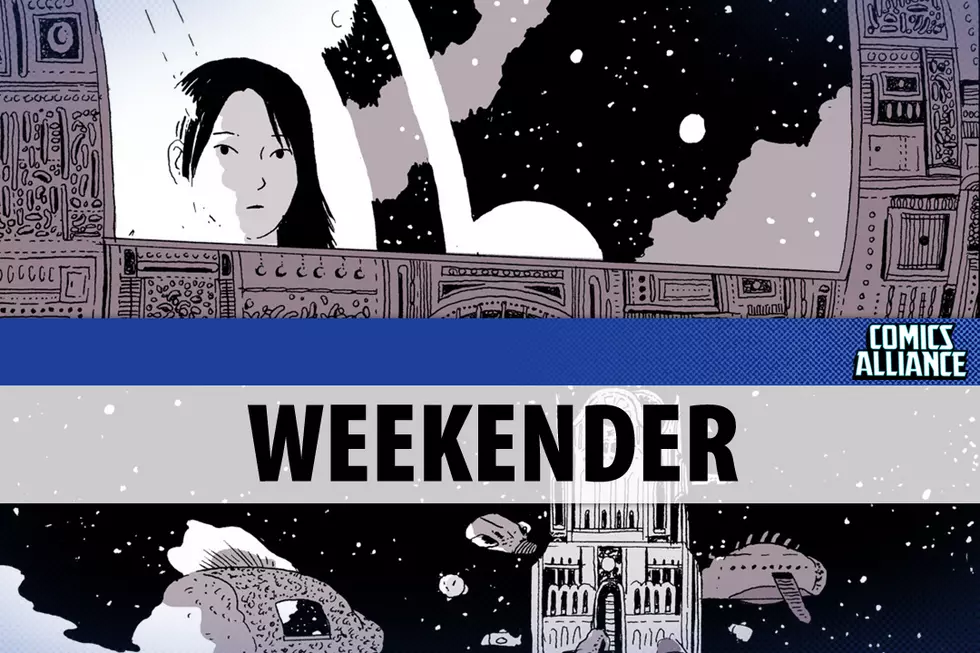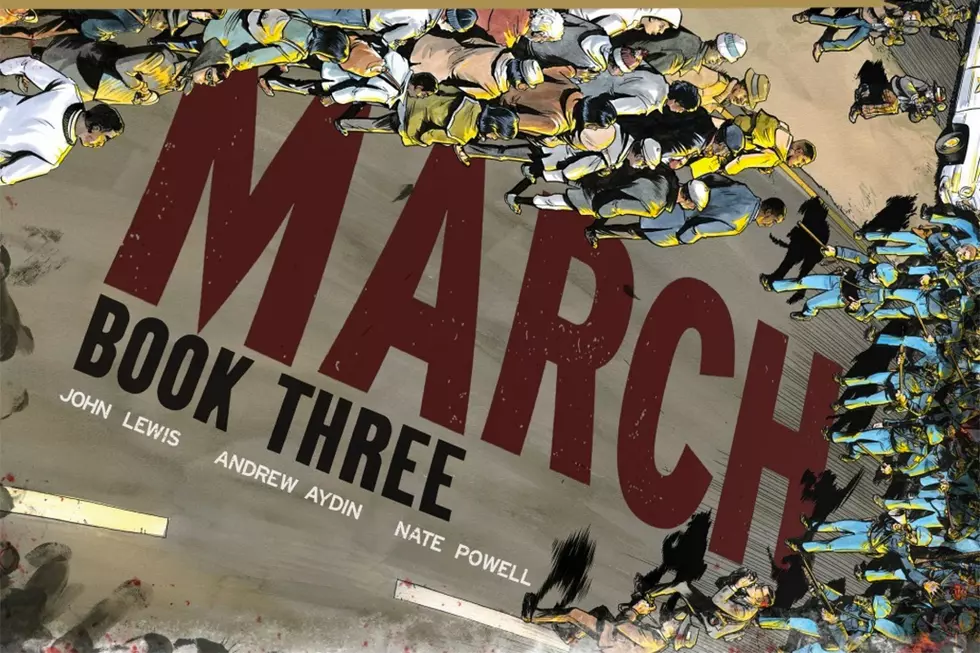![Congressman John Lewis Talked Comics, Congress And Civil Rights At The ‘March’ Panel [SDCC 2013]](http://townsquare.media/site/622/files/2013/07/Lewis-hed1.jpg?w=980&q=75)
Congressman John Lewis Talked Comics, Congress And Civil Rights At The ‘March’ Panel [SDCC 2013]
At this year's Comic-Con, a real life hero got a standing ovation. When Congressman John Lewis was introduced to a packed hall room at a panel dedicated to his upcoming autobiographical graphic novel March, every single person in the room stood and applauded. And after a lengthy ovation, Congressman Lewis -- a Civil Rights icon, the last surviving member of the group who spoke at the March on Washington and one of the most significant figures in America -- spoke to the crowd about Congress, Civil Rights, preaching to chickens, and of course, comic books.
The panel, moderated by Top Shelf's Leigh Walton, also featured March co-writer and congressional aide Andrew Aydin and artist Nate Powell. After being introduced, Congressman Lewis charmed the crowd with stories about his childhood -- particularly, about raising chickens, and how that experience taught him patience. He also shared with the audience that, when he was a child, he wanted to be a preacher, and would practice by speaking to the chickens his family raised (And when he mentioned that the chickens were better listeners, and more productive, than many members of Congress, the joke went over about as well as you would expect, given Congress' current approval rating). The patience he learned from that childhood task would play a large role in informing his actions as an adult, teaching him to “never give up, never give in, and never become hostile” when dealing with the indignities of the Jim Crow south. This led to Congressman Lewis discussing how his interests and passion in the Civil Rights movement grew, and how figures like Gandhi, Rosa Parks and Martin Luther King Jr. inspired him to do what he could to help. He spoke about a March on Washington and a bridge in Selma; on being arrested more than 40 times in his life, for having the audacity to stand up for human rights; on the signs he saw throughout his youth that said "No colored," signs he helped eradicate. Congressman Lewis spoke of being inspired in his youth to "make a little trouble," and he created March in the hope that it will reach a new generation:
“We’ve come a distance, but we still have a ways to go, a while to travel. And it is our hope that March will inspire some young people to get in the way, to make some trouble.”
Aydin, who was Congressman Lewis' press secretary during his re-election campaign in 2008, was the one who first introduced to the Congressman the idea of creating a comic about his life. Describing himself as a "fanboy," Aydin said he was asked in 2008 what he'd be doing after the election was over, and he confessed: "I’m going to a comic book convention." After thinking for a moment, Congressman Lewis told Aydin about a comic called The Montgomery Story.
The Montgomery Story was distributed throughout the south to teach what was then called The Montgomery Method, known now as the non-violence movement, used by Lewis and others during the Civil Rights era. The comic eventually made its way to South Africa, where it was banned for being incendiary. Most recently, an Arabic translation spread throughout Tahrir Square during the Arab Spring, inspiring a whole new generation in yet another movement toward freedom.
Aydin made it his business to track this comic down and read it, and that would lead to the creation of March:
“So after finding this comic, I went to Congressman Lewis and, because I was 24 and didn’t know any better, I said 'Why don’t you write a comic book?' He thought about it for a bit and said “Okay, but only if you work on it with me.”
“You have no idea what this means to me," said Aydin, his enthusiasm and pride in what they've accomplished coming out in every sentence. "I’m a fanboy. This is the coolest thing I’ve ever done."
"Comic books can change the world. I truly believe that. We’ve seen it happen.”
Powell, like Congressman Lewis, is a native of the south. The illustrator of March also worked on The Silence of Our Friends, another graphic novel that focused on Civil Rights. Powell spoke to the audience about how his experiences affected his contributions to the book, as well as the unique challenges the story presented. He shared a story from his childhood about being with his parents, when they suddenly saw a full Klan circle in broad daylight, in the townsquare, on public property. This was the moment when his parents had to attempt to explain racism and privilege to him. Events like this would lead to Powell "being drawn to narratives with highly subjective personal experiences." Powell also spoke to the anxiety he felt regarding illustrating such an important story, particularly when it came to depicting Martin Luther King, Jr.
As far as process, Powell showed a page of script and discussed breaking down pages into thumbnails, dealing with redundancies and pacing, and finding as many moments as possible to allow fans to “walk around in [Congressman Lewis'] shoes,” while drawing on his own experiences in the south from a “sensory standpoint.”
As the panel took questions, Congressman Lewis was asked about his feelings on the recent Supreme Court decision to repeal important aspects of the Voters Rights Act, a measure put in place to protect disenfranchised African-Americans in the south, and one he and others fought so hard to see pass. Regarding whether or not he felt Congress would do anything to counteract this decision, the Congressman shared his thoughts:
There is a movement in the congress on the part of several members. I like to be hopeful and optimistic, and keep my eyes on the prize. I think we’ll do it. The vote is the most powerful non-violent tool we have. It’s so powerful, it’s almost sacred.
Fifty years after the March on Washington, Congressman Lewis' eyes are still on the prize.
The first of a trilogy about the life of an American Icon, March (Book One) arrives in stores August 13th, 2013, from Top Shelf Comics.
More From ComicsAlliance









